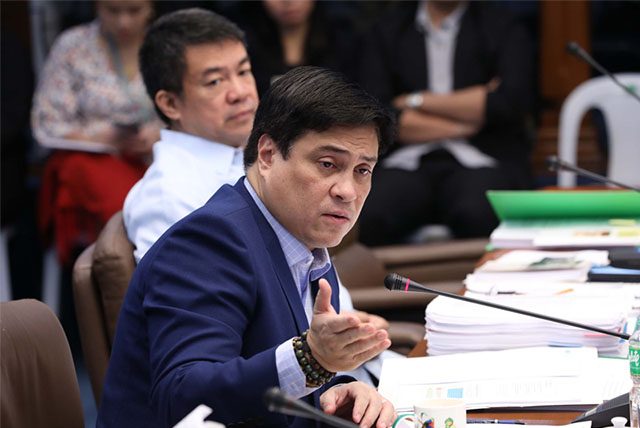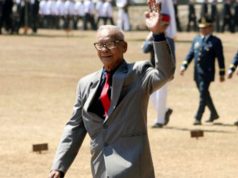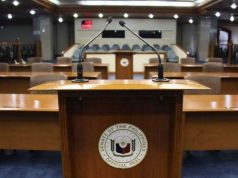A senator was reminded of the duties of media after calling on journalists to help beautify the country’s image when the United Nations Human Rights Committee called out the government over its drug war and media killings.
Senate President Juan Miguel Zubiri made the appeal in a press briefing on Monday, where he claimed that other countries such as Malaysia and Vietnam have it worse in terms of critical reportage.
“I appeal to the media, tulungan niyo naman kami na pagandahin ang imahe ng Pilipinas. Katulad noong Percy Lapid na iyan, nahuli na nga iyong bumaril at mahuhuli na nga iyong mastermind,” he said.
“Tumulong naman kayo i-announce ‘yan sa buong mundo. Buti sana kung hindi inaksyunan. If hindi inaksyunan, eh di sana I’ll stand with you here. Pero inaksyunan nila. Kaya iyan ang apila ko. We are a free media,” Zubiri added.
Various media outlets reported Lapid’s killing. He was the second journalist to be killed under the Marcos administration, and the first one based in Metro Manila.
The incident prompted the embassies of Canada and the Netherlands to release a statement: “Journalist killings create a chilling effect that curtails the ability of journalists to report news freely and safely.”
The two countries are co-chairs of the Media Freedom Coalition.
Latest reports on Lapid’s case said that suspended Bureau of Corrections chief Gerald Bantag colluded with gangs inside the New Bilibid Prison to carry out his kill order against the hard-hitting radio commentator.
The lawyer of journalist Roy Mabasa, who is Lapid’s brother, said there might be “persons higher than Bantag” involved in the killing.
Justice Secretary Boying Remulla, in response to speculations, said that they haven’t seen anyone else and are “not concerned with politics.”
“We still haven’t seen anyone else. We just follow the money and we just follow the evidence. It’s hard to speculate,” he said.
Meanwhile, Zubiri in his press briefing rejected the notion of the media facing a “chilling effect” in the country since journalists were not supposedly not stopped from doing their jobs.
A “chilling effect” is defined by the Supreme Court as “the fear of possible prosecution that hangs of the heads of citizens who are minded to step beyond the boundaries of what is proper.”
“From the United States to Europe, they have [a] share of problems of immigration and illegal detention of immigrants. No one is pointing fingers at them for their human rights [violations]. I don’t think that’s right. Then they [bring up] the media killings [here],” Zubiri said, responding to the UN Human Rights Committee’s concern about the Philippines.
“Nagagalit lang kapag sa tingin nila mali ang nailabas. Pero hindi naman forcibly pinipigilan kayo. When we were in the European Union, sabi namin ni Sen. Loren Legarda, kausap namin sila, sabi namin, it is not fair to paint the Philippines like that. The reason why you get news like that [is] because our media are free,” he added.
The UN Human Rights Committee previously expressed concern that the Anti-Terrorism Act of 2020 was being used to “legitimize the targeting of government critics, human rights defenders and journalists, including through ‘red-tagging,’ and consequent chilling effects on freedoms of expression, peaceful assembly and association.”
Following Zubiri’s appeal to the media, some Filipinos reminded him that the press’ responsibility is to report facts and not to beautify anyone or anything’s images.
“That’s not how the media works [though]??? Also, hindi nila responsibilidad na i-sugar coat ang news about it? [It] should be the truth, may it be ugly or not,” a Twitter user said in response to the lawmaker.
“Lol, [it’s] not the media’s job to beautify the Philippines situation. It’s YOUR responsibility and the government’s. Don’t be such an i*iot and pass your work to the media,” another Pinoy wrote.
“The purpose of the media is to inform the public about what is truly going on in the country. We need to strengthen our government to maintain a respectable public profile,” a different Filipino said.
“It’s not the media’s responsibility to improve the country’s image. Try to do something better first before you say that, lol,” tweeted another Pinoy.
A journalist is expected “to provide citizens with the information they need to make the best possible decisions about their lives, their communities, their societies, and their governments,” according to the American Press Institute.
They are obliged to convey facts and the truth in the public’s interest and to serve as an independent monitor of power by holding them into account.
Journalists are also obliged to be impartial and remain uninfluenced by outside entities.










